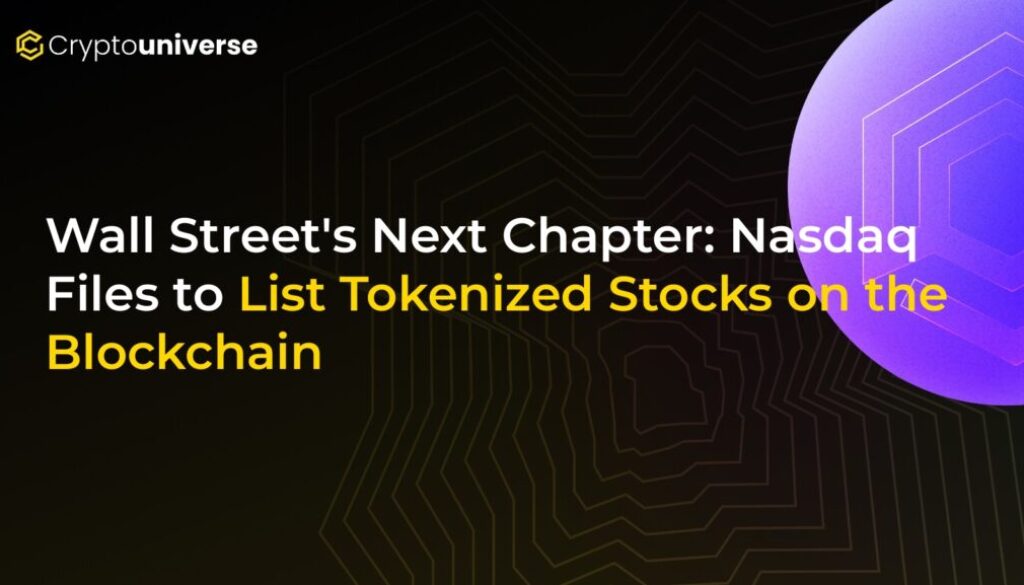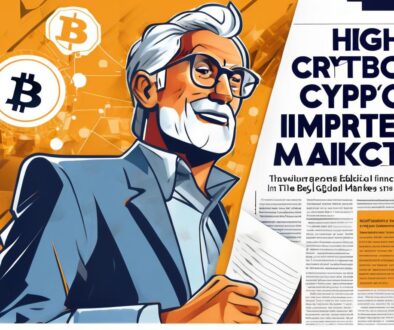Wall Street’s Next Chapter: Nasdaq Files to List Tokenized Stocks on the Blockchain

A Landmark Move: Nasdaq Pushes for a Tokenized Future
In a move that could fundamentally reshape the landscape of American finance, Nasdaq has officially submitted a rule change request to the U.S. Securities and Exchange Commission (SEC). The proposal’s goal is both simple and revolutionary: to enable the trading of tokenized stocks and exchange-traded products (ETPs) directly on its exchange. This filing signals a major step in bridging the gap between traditional financial markets (TradFi) and the burgeoning world of digital assets.
If approved, this would mark the first time tokenized securities are traded on a major U.S. stock exchange, setting a monumental precedent for the adoption of blockchain technology within the heart of the global financial system.
What Exactly is Nasdaq Proposing?
At its core, the proposal aims to integrate tokenized securities seamlessly into the existing market structure. This isn’t about creating a separate, niche market; it’s about upgrading the current one. Here are the key pillars of Nasdaq’s plan:
- Complete Fungibility: Tokenized shares will be fully interchangeable with their traditional counterparts. An investor holding a tokenized share of a company will have the exact same rights, privileges, and value as an investor holding a conventional share.
- Unified Trading Rules: Both versions of a stock—tokenized and traditional—would be traded under the same set of rules and order execution protocols. This ensures a level playing field and maintains market integrity.
- Flexible Settlement: While the Depository Trust Company (DTC) would continue to oversee post-trade processes, investors would gain a new level of flexibility. They could choose to settle their trades either in the conventional manner or in the tokenized form on the blockchain.
As Tal Cohen, President of Nasdaq, stated, “Today’s filing marks an early step in Nasdaq’s journey to bring digital assets technology into the U.S. equities markets… Our proposal aims to provide meaningful benefits to markets by integrating new capabilities into the fabric of our financial system.”
Why This is a Game-Changer for Crypto and Finance
The significance of the Nasdaq files to cannot be overstated. This move is more than just a technical upgrade; it’s a powerful validation of blockchain’s potential and a massive catalyst for the tokenization of real-world assets (RWAs).
1. The Rise of Real-World Asset (RWA) Tokenization
For years, the crypto industry has championed the concept of tokenizing real-world assets like stocks, real estate, and bonds. The potential benefits are immense:
- Enhanced Liquidity: By tokenizing traditionally illiquid assets, markets can become deeper and more accessible.
- Fractional Ownership: Blockchain makes it easy to divide assets into smaller, more affordable pieces, opening up investment opportunities to a wider audience.
- Increased Transparency: On-chain transactions provide an immutable and transparent record of ownership and transfers.
- Improved Efficiency: Smart contracts can automate complex processes like dividend payments and corporate actions, reducing costs and settlement times.
Nasdaq’s proposal takes RWA tokenization from a theoretical concept to a tangible reality on one of the world’s most important exchanges.
2. Bridging TradFi and DeFi
This initiative represents a powerful convergence of traditional finance and decentralized finance (DeFi). By bringing tokenized assets into a regulated, high-trust environment like Nasdaq, it provides a safe and familiar entry point for institutional and retail investors who have been hesitant to dive into the crypto world. It’s a responsible, regulated on-ramp that could unlock trillions of dollars in capital.
3. A Blueprint for the Future
The feasibility of this model has already been demonstrated. Recently, Galaxy Digital, with Superstate acting as the transfer agent, successfully showcased how a security’s book of record can be transferred from a conventional ledger to a blockchain. This proof-of-concept shows that the technology is ready for prime time.
What Happens Next? The Ball is in the SEC’s Court
With the filing officially submitted, the financial world now waits for the SEC’s response. An approval would be a watershed moment, not only legitimizing tokenized securities but also likely prompting other major exchanges to follow suit. It would kickstart a new wave of innovation, combining the reliability and scale of traditional markets with the efficiency and transparency of blockchain technology.
Nasdaq’s bold move is a clear declaration that the future of finance is intertwined with digital assets. The integration of stocks on the blockchain is no longer a distant dream—it’s a concrete proposal sitting on the regulator’s desk, poised to redefine how we trade and own assets forever.


